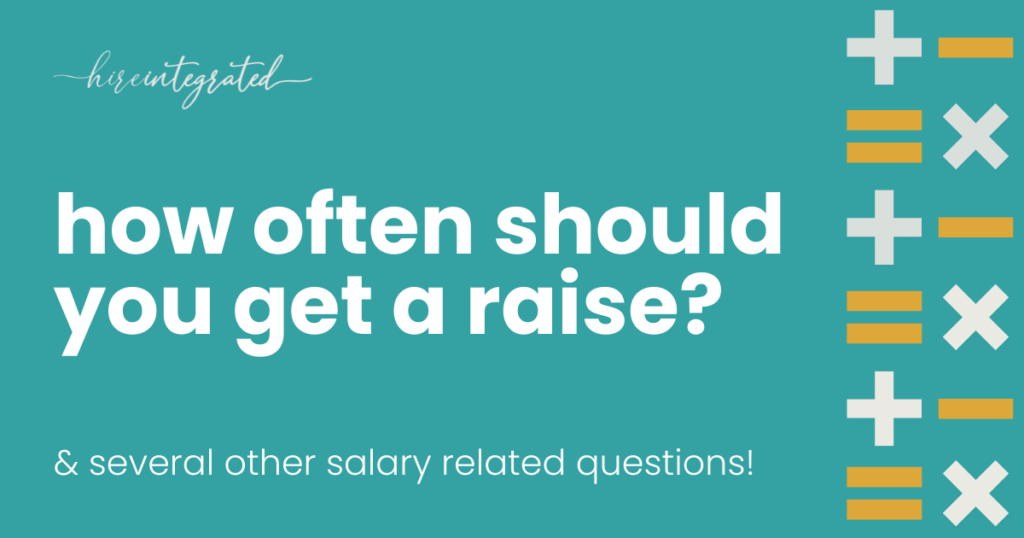Talking about money gets awkward, no matter what setting you are in. Discussing a salary is no exception to this. Since money is such a touchy subject, you must know how to approach the topic before launching into a discussion about it. If you are looking to get a raise from your employer, you need to be prepared before you walk into their office.
So many wonder when they will finally receive that raise that they have been working so hard for. After all, shouldn’t you receive a raise if you have been performing above your boss’s expectations? There are so many questions surrounding raise and this article will walk through the key questions surrounding raises.

How Often Should You Get a Raise?
Naturally, as you become more capable in your position you begin to expect a raise in compensation. But, how often does this raise actually come? Investopedia reports that most employers give employees a 3% pay increase per year. Most companies operate according to this yearly pay increase.
However, other factors could be in play that entitle you to a raise. Significant accomplishments, like getting a big deal or valuable client for your company, could qualify you to receive a raise. If you have recently received a promotion or have been assigned additional responsibilities beyond your core assignments, it might be appropriate to ask for a raise.
How Often Should You Ask for a Raise?
The general consensus from most professionals is to ask for a raise once a year. This allows you to generate results so you can prove your value to your employer. Additionally, most companies grant raises every year, making it more likely that you will receive the raise you desire.
After joining a company, you should wait at least 6 months to a year before asking for a raise. Companies reward loyalty and will be more likely to give raises after a full year of employment. Wait to ask for a raise until you can verify that you are an asset to the company.
What Impacts Your Raise?
Beyond performance and accomplishments, there are a handful of factors that might impact how much a company will increase your pay by. Here are several items that might influence how much your raise is:
- Promotions: One of the best qualifiers for a pay raise is receiving a promotion. With the increased responsibilities traditionally comes additional compensation.
- Inflation: As prices soar, employees naturally expect their salary to do the same. One issue with this is that the cost to run the business also increases with inflation. Regularly touching base with your employer regarding your pay is the key to combating this.
- Industry/Sector: While this won’t cause a monumental difference in your pay increase, there are some slight nuances between different industries. Government workers, for example, receive smaller raises than those in the private sector.
- Location: Do a little research on pay raises in your city. Pay increases vary widely by the location you are in and its economic condition. Even within states the pay increase can have a wide range from city to city, so make sure that you are informed beforehand.

Remember It’s Not All About the Money
Despite always being taught that it is all about the money, there is more to negotiate for than just a pay increase. If you are unsuccessful in negotiating for higher pay, there are other options. Consider negotiating regarding the following: career development opportunities, a change in responsibilities, travel, flexible working hours, and other perks. There is more to it than just a salary negotiation.
How To Ask for a Raise:
Once you are ready to ask for a raise, know that there are a few preparation steps to ensure that you are successful in your request. Keep in mind that you need to make sure that it is the right time before going in to talk to your boss. Confirm that they are in a good mood before asking for a pay increase, as this could dramatically influence whether or not you get the raise. As you prepare for your request for a pay increase, work through the following steps:

1. In-Person or Email
Deciding the channel through which you will talk to your boss about a pay raise will be a big influencer on your strategy moving forward. You will have to adjust if you ask them in-person or over email according to the personality and preferences of your boss.
Would your boss prefer time to look over your request and decide on their own? Or would it be easier for them if you could openly discuss the request? Ponder and decide what you think would be the best choice for your boss.
2. Be Informed
You must go into an interview after having done your research. Look up salaries and pay raises related to your position. Include your location in your research regarding salaries and raises, since this is a big influencer of the financial abilities of a business.
Understand that you are never guaranteed to get a raise. Even if you have been meeting all your job requirements, you are not entitled to raise. Often, employers grant raises to those that are truly going above and beyond. Make sure that your case is compelling.
3. Write up a Script
You need to know what you are going to say before talking to your boss. Have an “argument” or rationale for why you should receive the raise. In this negotiation, you will have to justify why you are deserving of the raise, so don’t come in without facts or examples of why you qualify for additional pay.
Keeping a journal or some other form of record keeping is a great way to track progress and gather data that you can use in a discussion regarding salary. Discuss how you are meeting and surpassing the goals set for your role. If you have taken on any additional responsibilities, be sure to mention this here.
If you would like to take on more responsibility to justify a raise, explain why you could take on these new tasks and assignments. The key to this step is having back up for whatever salary you suggest.
As you prepare, draft up some potential salaries that you might be comfortable with. Bring up the research you did regarding salary ranges and pay increases in your location.
4. Have a Backup Plan
As painful as it is to think about, what will happen if they say no? You must be prepared for this answer. How will you react if they cannot grant your request? Threatening to quit is highly unprofessional and never advised. Have a plan in mind for what you will do or say if they say no.
If your boss claims that they cannot grant a raise at this time, ask how you can qualify for a pay raise. This can be a great learning opportunity and a chance to show your employer that you are teachable and willing to negotiate.
Last Thoughts
No matter what, be sure that you are prepared before any discussion regarding a raise. Never be spontaneous in asking for a raise. While there are no guarantees when it comes to raises, following these tips will highly increase your odds of landing the pay increase you desire.
Need more career advice? Check out the Hire Integrated blog.










